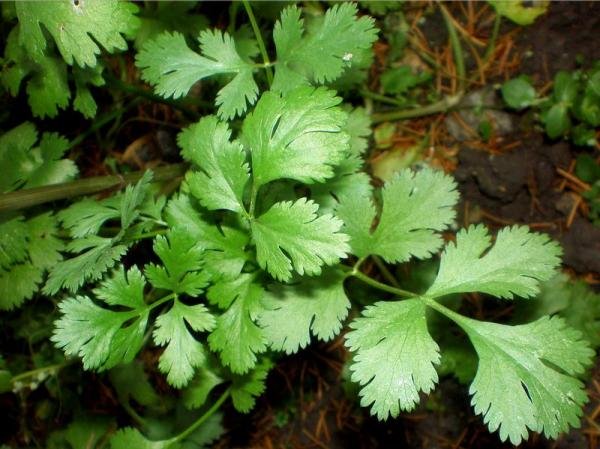Coriander and its Benefits.
Community @steemit, coriander is a plant of the same family as carrots, celery and parsley. It is also called Chinese or Mexican parsley. All parts of coriander are edible, but mostly they only use leaves and seeds. Due to its similarity, the plant is confused with parsley, but the taste of coriander is brighter and richer.
The beneficial properties of coriander and its unusual flavor make it possible to use the plant in many cuisines of the world. Add flavor to any dish, sauce or drink. Coriander is combined with fish, beans, cheese and eggs. It can be a component of a salad, sauce, soup or garnish.
Choose fresh coriander, as it has a richer flavor and aroma. The leaves should be bright green without yellow and dark spots, and the stems are dense and firm.
Coriander can be grown at home, planted in a drained soil and placed on a sunny windowsill. To obtain smooth and juicy leaves, they must be collected before the plant begins to flower. If the objective is coriander seeds, you should wait until small oval seeds appear at the site of the inflorescences.
Coriander is rich in antioxidants, phytonutrients, flavonoids and phenols. It has few calories, saturated fats and cholesterol. Coriander leaves contain many essential oils such as borneol, pinene and terpinol.
Adding coriander to the diet will help get rid of health problems and improve the taste of the dishes.
The consumption of coriander reduces the risk of obesity, diabetes and heart disease. Coriander is useful for menstrual disorders, smallpox and conjunctivitis.
Vitamin K in coriander strengthens bones. The plant can be used as a prophylactic against osteoporosis. In addition, vitamin K in coriander plays an important role in the coagulation of blood and improves blood circulation.
The antioxidants in coriander make it a natural analgesic and anti-inflammatory for arthritis, and phenols help reduce the inflammation caused by arthritis and rheumatic diseases.
Coriander leaves help normalize blood sugar levels and prevent the development of diabetes.
Potassium in coriander is involved in the control of blood pressure, reducing the effects of sodium in the body. Coriander helps dissolve the buildup of cholesterol in the arteries, protecting against atherosclerosis and heart disease. The polyphenols in coriander will help prevent myocardial infarction.
Coriander is rich in iron, which protects against the development of anemia. Low levels of iron in the blood can cause heart disease, shortness of breath and rapid heartbeat.
Coriander is a natural sedative. The plant calms the nerves and can improve the quality of sleep, due to the sedative effect.
Regular consumption of coriander prevents neurodegenerative diseases, such as Alzheimer's disease, Parkinson's and brain tumors.
Coriander is rich in vitamin A and carotenoids. They are useful for the retina, which detects light and color. Vitamin C and phosphorus in coriander prevent visual deterioration, macular degeneration and reduce eye fatigue.
The essential oil of citronellol in coriander has antiseptic properties that prevent the development of ulcers in the mouth due to the strong growth of bacteria. It is part of the natural mouthwash and toothpastes.
Coriander improves the production of digestive enzymes that help in the decomposition of food. It acts as a remedy for the treatment of nausea, the prevention of gas and bloating, the relief of heartburn and also for the elimination of spasms in the stomach. Coriander helps keep the liver functioning, protecting your cells from toxins. This is due to the polyphenols that form the leaves.
The antibacterial compounds in coriander help keep the urinary tract healthy and eliminate the bacteria that cause infectious diseases. Coriander increases the filtration rate of urine in the kidneys and prevents the formation of edema. It improves kidney function and eliminates toxins and germs, keeping the urinary system clean.
The flavonoids in coriander allow you to maintain a healthy menstrual function by regulating the work of the endocrine glands and the production of hormones that are responsible for the menstrual cycle. Coriander for women is beneficial because it can reduce swelling, cramping and pain during the cycle.
Coriander leaves contain antioxidants, carotenoids and aromatic acids, which remove heavy metals from the body. They slow down the aging process. Coriander can cure bacterial or fungal infections of the skin, relieve irritation and protect the skin from the negative effects of ultraviolet radiation.
Coriander is good for the health of the immune system. Thanks to quercetin, it protects the body from damage caused by free radicals. The phthalides and terpenoids in coriander slow down the formation and growth of cancer cells.
Coriander cleanses the body of toxins. The compounds in the coriander leaves are associated with heavy metals and eliminate them and the affected tissue.
For a long time, coriander acted as a powerful aphrodisiac that increases male libido. This is due to quercetin and essential oils. Coriander stimulates the sexual glands and increases sexual desire and male power. In addition, it avoids the power reduction.

Hello! I find your post valuable for the wafrica community! Thanks for the great post! We encourage and support quality contents and projects from the West African region.
Do you have a suggestion, concern or want to appear as a guest author on WAfrica, join our discord server and discuss with a member of our curation team.
Don't forget to join us every Sunday by 20:30GMT for our Sunday WAFRO party on our discord channel. Thank you.